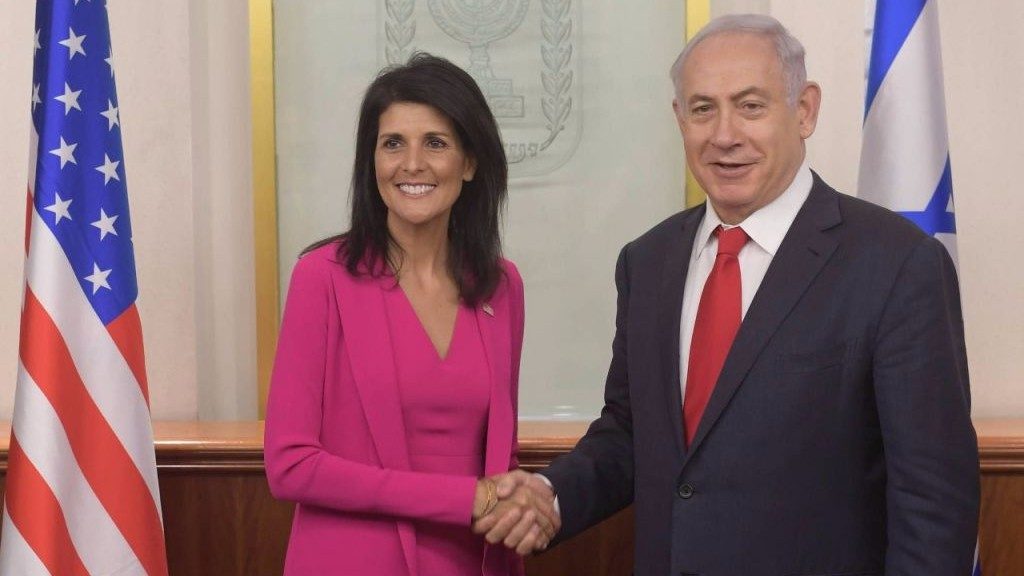“Israel on Trial” – 70 Years of Delegitimisation of Israel in the UN
By Andrew Tucker, Director and Matthijs de Blois, Senior Fellow, The Hague Initiative for International Cooperation (’thinc’).. US President Trump’s announcement in December 2017 to recognise Israel’s designation of Jerusalem as the capital of the State of Israel, and to move the US embassy in Israel from Tel Aviv to Jerusalem, provoked an explosion of international outrage, especially (but not only) in the Muslim world. The reaction is remarkable. Trump simply effectuated a decision taken by the US Congress in 1995 and did not in any way change either the situation on the ground in Jerusalem or the status of the city under Israeli or international law. He even left open the question whether the US Embassy would be located in West or East Jerusalem. Yet the sole fact that he recognised Jerusalem as capital of Israel was apparently enough to turn the diplomatic world upside down. The UN General Assembly responded with resolutions effectively condemning Trump and forbidding states to move their embassies to Jerusalem.
Israel has been consistently criticised in the United Nations ever since its creation on 14 May 1948, and especially since Israel assumed control of East Jerusalem and the West Bank in 1967. Every month, UN General Assembly adopts resolutions on the Israel/Palestine conflict, and everyday media around the world report use international law to criticise Israeli ‘occupation’ and ‘settlements’ as ‘dangerously imperiling the viability of the two-State solution’ and an ‘obstacle to global peace’.
Even though Israel is formally a UN member since 1949, Israel has never really been accepted as a full member of the international community of nations:
- Israel is the only member of the United Nations that until recently has not been eligible for representation in the Security Council.
- Jerusalem is the only city in the world over which the UN claims to have a special jurisdiction, and Israel is the only country that is denied the right to declare a particular city as its capital.
- More resolutions in the UN General Assembly and Security Council are devoted to criticising Israel than any other state.
- More institutions and projects have been established within the United Nations devoted to the Palestinian cause than to any other people claiming the right to self-determination.
- ‘Palestine’ is the only nation to which the UN member states demand its statehood and contribute annually hundreds of millions of dollars.
- The Israel/Palestine conflict is the only conflict in the world in relation to which the United Nations seeks to impose a particular solution – notwithstanding the objections of one of the parties to the conflict.
- Thirty percent of the resolutions concerning specific states adopted by the UN Human Rights Commission in the forty years of its existence were against Israel. Israel is the only country that warrants a dedicated place on the agenda of its replacement on the UN Human Rights Council.
- The Palestinian refugees are the only refugees in the world whose so-called ‘right of return’ is constantly tabled in international fora, and Israel is the only nation in the world that is alleged to be under an obligation to re-accept the descendants of refugees that fled from its territories in a time of conflict.
Since the Arab states (Egypt, Jordan, Syria) failed to destroy Israel in the 1973 Yom Kippur War, they and the other Arab and Islamic nations have used the United Nations institutions to ‘delegitimise’ Israel and push the ‘two-State solution’. And blocks of other nations – especially European, African and South American – have supported them. The Arab-Europe alliance, as reflected in the Euro-Arab Dialogue, has institutionalised European support for the Arabs’ political and military objectives of destroying the Jewish State. This reached its zenith in December 2016, when the UN Security Council (USA abstaining – the last diplomatic initiative of outgoing President Obama and Secretary of State Kerry) adopted Resolution 2334 in which it effectively laid down the terms upon which Israel is obliged to accept the ‘two- State solution’. The Resolution has a major influence on the way many states formulate their foreign policy in relation to Israel/Palestine.
The ‘two-State solution’ sounds just and equitable, but in fact, it represents an assault on Israel’s sovereignty as a nation state. It is also a fundamental breach of the promises made by the international community to the Jewish people after WWI – less than 100 years ago – through the League of Nations that Jerusalem and all the territories that are now normally referred to as ‘occupied territories’ would be reserved for the establishment of a Jewish homeland – with guaranteed protection of the civil and religious rights of all inhabitants of Palestine (Jews and non-Jews).
Israel’s critics use strong legal language (’legitimate aspirations’, ‘rights to statehood and sovereignty’, ‘condemns’ etc.) and attribute great importance to United Nations resolutions.
But UN resolutions do not constitute binding international law, and many of these statements made in those resolutions are quite simply false or misleading. An increasing number of academics argue that:
1. Israel has the right to exist as a sovereign State enjoying peace and security as all other States;
2. Israel is under no obligation to withdraw from the ‘occupied territories’ or remove Israeli settlements;
3. The creation of a State of Palestine is not required under international law;
4. Even if it were, the United Nations and its member states have no jurisdiction to determine the borders between that state and the State of Israel;
5. In any event, the borders mandated in Resolution 2334 (the ‘4 June 1967 lines’) infringe Israel’s rights under international law; and
6. Third states are under no obligation to enforce the ‘two-State solution’ or facilitate the creation of the State of Palestine; on the contrary, to do so in terms of Resolution 2334 constitutes a fundamental infringement of Israel’s rights.
The discriminatory interpretation and application of international law to Israel/Palestine is not only unfair to Israel; it is producing perverse results. Worse, this ‘instrumental’ use of international law to achieve political or military goals is threatening to undermine the credibility of the international legal system itself.
There is hope. Sixty-five nations did not vote for the December 2017 resolution condemning the recognition by President Trump of Jerusalem as the capital of Israel and his announcement to move the US Embassy to Jerusalem. There is a growing understanding within the UN that the international legal system is being misused. The challenge now is to transform that understanding into concrete political action that gives full recognition to the Jewish people and the Jewish State of Israel.






